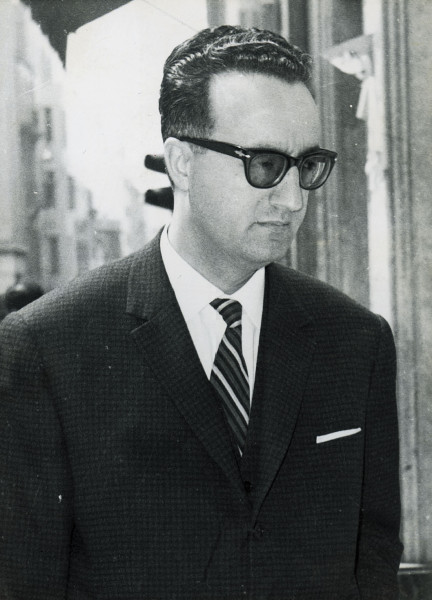
Christos Sartzetakis, born in 1929, passed away today at the age of 93 after a long hospitalization.
He was born in Neapoli, Thessaloniki in 1929. His father, who was serving as a Gendarmerie officer in Thessaloniki – where he met his mother – was a Cretan, having been born in Kandanos, Chania, while his mother, who was born in Sklithro, Florina, was a Greek Macedonian.
He entered the Law Faculty of the University of Thessaloniki in 1946, and received his degree in 1950, after which he practised law in Thessaloniki. In 1954 he received his license to practice law after successfully completing the bar examination. In November 1955, he was named Justice of the Peace. A year later, he became a magistrate of the Court of First Instance.
He was the unyielding prosecutor in the sensational case of the assassination of the left-wing member of Parliament (and ‘doctor of the poor’) Grigoris Lambrakis, committed on 22 May 1963 in Thessaloniki by right-wing extremists. Lambrakis had called for Greece to disarm and withdraw from NATO. Over half a million people attended his funeral. Despite obstruction of justice by his superiors, Sartzetakis doggedly pursued his investigation to the end. He succeeded in convicting the police officers involved in the murder; they were later rehabilitated by the Greek military junta of 1967-1974.

The circumstances of the Lambrakis investigation was the theme of the well-known 1966 novel Z by Vassilis Vassilikos, and Sartzetakis was portrayed by Jean-Louis Trintignant in the novel’s 1969 film adaptation by Costas Gavras.
After the Lambrakis prosecution, Sartzetakis left for Paris on a state-sponsored educational leave to study comparative law at the Faculté de Droit et des Sciences Économiques de Paris and the Centre Universitaire des Études des Communautés Européennes. Immediately following the coup d’état of 21 April 1967 by George Papadopoulos, he was called back to Athens by the military junta. Along with 29 other magistrates, he was discharged by a “Constitutional Act” from all his legal functions on 29 May 1968. He was twice arrested, and imprisoned for almost a year until he was released on 19 November 1971 under mounting international pressure. During his captivity, he was tortured by the Greek Military Police.
In September 1974, after the toppling of the dictatorship and the restoration of the democracy in Greece, Sartzetakis was completely rehabilitated. In the following years he became chairman of the Court of Appeal and finally, in October 1982, a member of the Court of Cassation. Sartzetakis became a fellow of several international legal societies. He also wrote several legal and political studies.
In March 1985, the government headed by Prime Minister Andreas Papandreou announced plans to reduce the powers of the presidency, and the governing party PASOK refused to renew the term of Konstantinos Karamanlis. Karamanlis resigned, and Sartzetakis was elected by the parliament to a 5-year term as the fourth President of the Hellenic Republic (or fifth, including President pro tempore Alevras). Holding no official political affiliation, Sartzetakis was President from 30 March 1985 to 5 May 1990.
Sartzetakis is widely viewed as a hero of democracy. Although he is thought of highly by the Greek Left, he was always an anti-communist Greek nationalist in his personal political views. His zeal to uncover the facts behind the Lambrakis assassination was not based on his political views, but on his professionalism and sense of duty. He still attends many ceremonial events in Greece, including patriotic celebrations. Sartzetakis has been honored several times as doctor honoris causa and been given the highest decorations of many states. He is still widely known and respected for his integrity as a judge, and as a fighter for democracy.
Latest News

New Exposé by Domumento Reveals Nefarious Triangular Link of ‘Black Money’ with New Democracy, Blue Skies, & Truth Team
The latest exposé by the Documentonews.gr news site lays bare what appears to be a surreptitious path of indirect financing of ND through the business sector—transactions that, as widely understood, rarely occur without expectations of reciprocal benefit

PM Meloni Meets Vice President Vance in Rome Signalling Optimism on Ukraine Talks
Meloni emphasized the strength and strategic value of the Italy-U.S. partnership.

Airbnb: Greece’s Short-Term Rentals Dip in March Amid Easter Shift
Data from analytics firm AirDNA shows that average occupancy for short-term rentals dropped to 45% in March, down from 49% the same month last year.

Easter Week in Greece: Holy Friday in Orthodoxy Today
At the Vespers service on Friday evening the image of Christ is removed from the Cross and wrapped in a white cloth

Meloni and Trump Meet in Washington, Vow to Strengthen Western Ties
“I am 100% sure there will be no problems reaching a deal on tariffs with the EU—none whatsoever,” Trump stressed.

ECB Cuts Interest Rates by 25 Basis Points in Expected Move
The ECB’s Governing Council opted to lower the deposit facility rate—the benchmark for signaling monetary policy direction—citing an updated assessment of inflation prospects, the dynamics of underlying inflation, and the strength of monetary policy transmission.

Current Account Deficit Fell by €573.2ml Feb. 2025: BoG
The improvement of Greece’s current account was mainly attributed to a more robust balance of goods and, to a lesser extent, an improved primary income account

Hellenic Food Authority Issues Food Safety Tips for Easter
Food safety tips on how to make sure your lamb has been properly inspected and your eggs stay fresh.

Greek Kiwifruit Exports Smash 200,000-Ton Mark, Setting New Record
According to data by the Association of Greek Fruit, Vegetable and Juice Exporters, Incofruit Hellas, between September 1, 2024, and April 17, 2025, kiwifruit exports increased by 14.2%.

Easter Tourism Boom: Greece Sees 18.3% Surge in Hotel Bookings
Among foreign markets, Israel has emerged as the biggest growth driver, with hotel bookings more than doubling—up 178.5% year-on-year.







![Πλημμύρες: Σημειώθηκαν σε επίπεδα ρεκόρ στην Ευρώπη το 2024 [γράφημα]](https://www.ot.gr/wp-content/uploads/2025/04/FLOOD_HUNGRY-90x90.jpg)





![Airbnb: Πτωτικά κινήθηκε η ζήτηση τον Μάρτιο – Τι δείχνουν τα στοιχεία [γράφημα]](https://www.ot.gr/wp-content/uploads/2024/07/airbnb-gba8e58468_1280-1-90x90.jpg)











![Επιχειρήσεις: Με τι επιτόκιο δανείζονται – Πώς θα ξεκλειδώσει περισσότερη ρευστότητα [γράφημα]](https://www.ot.gr/wp-content/uploads/2025/04/daneia-trapezes-768x432-1-600x338.jpg)














 Αριθμός Πιστοποίησης
Αριθμός Πιστοποίησης